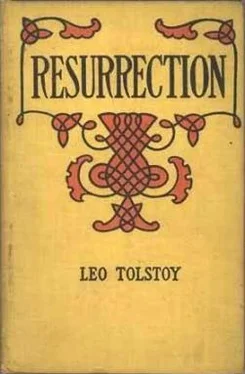Leo Tolstoy - Resurrection
Здесь есть возможность читать онлайн «Leo Tolstoy - Resurrection» весь текст электронной книги совершенно бесплатно (целиком полную версию без сокращений). В некоторых случаях можно слушать аудио, скачать через торрент в формате fb2 и присутствует краткое содержание. Жанр: Русская классическая проза, на английском языке. Описание произведения, (предисловие) а так же отзывы посетителей доступны на портале библиотеки ЛибКат.
- Название:Resurrection
- Автор:
- Жанр:
- Год:неизвестен
- ISBN:нет данных
- Рейтинг книги:4 / 5. Голосов: 1
-
Избранное:Добавить в избранное
- Отзывы:
-
Ваша оценка:
- 80
- 1
- 2
- 3
- 4
- 5
Resurrection: краткое содержание, описание и аннотация
Предлагаем к чтению аннотацию, описание, краткое содержание или предисловие (зависит от того, что написал сам автор книги «Resurrection»). Если вы не нашли необходимую информацию о книге — напишите в комментариях, мы постараемся отыскать её.
Resurrection — читать онлайн бесплатно полную книгу (весь текст) целиком
Ниже представлен текст книги, разбитый по страницам. Система сохранения места последней прочитанной страницы, позволяет с удобством читать онлайн бесплатно книгу «Resurrection», без необходимости каждый раз заново искать на чём Вы остановились. Поставьте закладку, и сможете в любой момент перейти на страницу, на которой закончили чтение.
Интервал:
Закладка:
“That may be so, but I do not allow it,” and his tone implied, “You city gentlemen may think to surprise and perplex us, but we in Eastern Siberia also know what the law is, and may even teach it you.” The copy of a document straight from the Emperor’s own office did not have any effect on the prison inspector either. He decidedly refused to let Nekhludoff come inside the prison walls. He only smiled contemptuously at Nekhludoff’s naive conclusion, that the copy he had received would suffice to set Maslova free, and declared that a direct order from his own superiors would be needed before any one could be set at liberty. The only things he agreed to do were to communicate to Maslova that a mitigation had arrived for her, and to promise that he would not detain her an hour after the order from his chief to liberate her would arrive. He would also give no news of Kryltzoff, saying he could not even tell if there was such a prisoner; and so Nekhludoff, having accomplished next to nothing, got into his trap and drove back to his hotel.
The strictness of the inspector was chiefly due to the fact that an epidemic of typhus had broken out in the prison, owing to twice the number of persons that it was intended for being crowded in it. The isvostchik who drove Nekhludoff said, “Quite a lot of people are dying in the prison every day, some kind of disease having sprung up among them, so that as many as twenty were buried in one day.”
XXIV
The general’s household.
In spite of his ineffectual attempt at the prison, Nekhludoff, still in the same vigorous, energetic frame of mind, went to the Governor’s office to see if the original of the document had arrived for Maslova. It had not arrived, so Nekhludoff went back to the hotel and wrote without delay to Selenin and the advocate about it. When he had finished writing he looked at his watch and saw it was time to go to the General’s dinner party.
On the way he again began wondering how Katusha would receive the news of the mitigation of her sentence. Where she would be settled? How he should live with her? What about Simonson? What would his relations to her be? He remembered the change that had taken place in her, and this reminded him of her past. “I must forget it for the present,” he thought, and again hastened to drive her out of his mind. “When the time comes I shall see,” he said to himself, and began to think of what he ought to say to the General.
The dinner at the General’s, with the luxury habitual to the lives of the wealthy and those of high rank, to which Nekhludoff had been accustomed, was extremely enjoyable after he had been so long deprived not only of luxury but even of the most ordinary comforts. The mistress of the house was a Petersburg grande dame of the old school, a maid of honour at the court of Nicholas I., who spoke French quite naturally and Russian very unnaturally. She held herself very erect and, moving her hands, she kept her elbows close to her waist. She was quietly and, somewhat sadly considerate for her husband, and extremely kind to all her visitors, though with a tinge of difference in her behaviour according to their position. She received Nekhludoff as if he were one of them, and her fine, almost imperceptible flattery made him once again aware of his virtues and gave him a feeling of satisfaction. She made him feel that she knew of that honest though rather singular step of his which had brought him to Siberia, and held him to be an exceptional man. This refined flattery and the elegance and luxury of the General’s house had the effect of making Nekhludoff succumb to the enjoyment of the handsome surroundings, the delicate dishes and the ease and pleasure of intercourse with educated people of his own class, so that the surroundings in the midst of which he had lived for the last months seemed a dream from which he had awakened to reality. Besides those of the household, the General’s daughter and her husband and an aide-de-camp, there were an Englishman, a merchant interested in gold mines, and the governor of a distant Siberian town. All these people seemed pleasant to Nekhludoff. The Englishman, a healthy man with a rosy complexion, who spoke very bad French, but whose command of his own language was very good and oratorically impressive, who had seen a great deal, was very interesting to listen to when he spoke about America, India, Japan and Siberia.
The young merchant interested in the gold mines, the son of a peasant, whose evening dress was made in London, who had diamond studs to his shirt, possessed a fine library, contributed freely to philanthropic work, and held liberal European views, seemed pleasant to Nekhludoff as a sample of a quite new and good type of civilised European culture, grafted on a healthy, uncultivated peasant stem.
The governor of the distant Siberian town was that same man who had been so much talked about in Petersburg at the time Nekhludoff was there. He was plump, with thin, curly hair, soft blue eyes, carefully-tended white hands, with rings on the fingers, a pleasant smile, and very big in the lower part of his body. The master of the house valued this governor because of all the officials he was the only one who would not be bribed. The mistress of the house, who was very fond of music and a very good pianist herself, valued him because he was a good musician and played duets with her.
Nekhludoff was in such good humour that even this man was not unpleasant to him, in spite of what he knew of his vices. The bright, energetic aide-de-camp, with his bluey grey chin, who was continually offering his services, pleased Nekhludoff by his good nature. But it was the charming young couple, the General’s daughter and her husband, who pleased Nekhludoff best. The daughter was a plain-looking, simple-minded young woman, wholly absorbed in her two children. Her husband, whom she had fallen in love with and married after a long struggle with her parents, was a Liberal, who had taken honours at the Moscow University, a modest and intellectual young man in Government service, who made up statistics and studied chiefly the foreign tribes, which he liked and tried to save from dying out.
All of them were not only kind and attentive to Nekhludoff, but evidently pleased to see him, as a new and interesting acquaintance. The General, who came in to dinner in uniform and with a white cross round his neck, greeted Nekhludoff as a friend, and asked the visitors to the side table to take a glass of vodka and something to whet their appetites. The General asked Nekhludoff what he had been doing since he left that morning, and Nekhludoff told him he had been to the post-office and received the news of the mitigation of that person’s sentence that he had spoken of in the morning, and again asked for a permission to visit the prison.
The General, apparently displeased that business should be mentioned at dinner, frowned and said nothing.
“Have a glass of vodka,” he said, addressing the Englishman, who had just come up to the table. The Englishman drank a glass, and said he had been to see the cathedral and the factory, but would like to visit the great transportation prison.
“Oh, that will just fit in,” said the General to Nekhludoff. “You will be able to go together. Give them a pass,” he added, turning to his aide-de-camp.
“When would you like to go?” Nekhludoff asked.
“I prefer visiting the prisons in the evening,” the Englishman answered. “All are indoors and there is no preparation; you find them all as they are.”
“Ah, he would like to see it in all its glory! Let him do so. I have written about it and no attention has been paid to it. Let him find out from foreign publications,” the General said, and went up to the dinner table, where the mistress of the house was showing the visitors their places. Nekhludoff sat between his hostess and the Englishman. In front of him sat the General’s daughter and the ex-director of the Government department in Petersburg. The conversation at dinner was carried on by fits and starts, now it was India that the Englishman talked about, now the Tonkin expedition that the General strongly disapproved of, now the universal bribery and corruption in Siberia. All these topics did not interest Nekhludoff much.
Читать дальшеИнтервал:
Закладка:
Похожие книги на «Resurrection»
Представляем Вашему вниманию похожие книги на «Resurrection» списком для выбора. Мы отобрали схожую по названию и смыслу литературу в надежде предоставить читателям больше вариантов отыскать новые, интересные, ещё непрочитанные произведения.
Обсуждение, отзывы о книге «Resurrection» и просто собственные мнения читателей. Оставьте ваши комментарии, напишите, что Вы думаете о произведении, его смысле или главных героях. Укажите что конкретно понравилось, а что нет, и почему Вы так считаете.












